
We speak with Carlos Fernández de Cossío, Cuba’s deputy foreign minister, about the Trump administration’s tightening restrictions on the country. Since returning to the White House, President Donald Trump has reinstated Cuba’s designation as a so-called state sponsor of terrorism, recommitted to upholding the decadeslong economic embargo and targeted Cuban immigrants for deportation. Secretary of State Marco Rubio is now going after Cuba’s medical program that sends Cuban doctors and healthcare workers to assist other countries. The island nation was also among the countries on Trump’s travel ban that went into effect last week, severely limiting Cuban nationals from entering the U.S. This all comes as the Trump administration is reportedly planning to transfer thousands of immigrants to be detained at Guantánamo Bay. Fernández de Cossío says the influence of anti-Cuban politicians in the U.S. is “greater than any previous moment,” which allows them to push “this narrow approach, which is not relevant to the interests of most Americans.”
Transcript
AMY GOODMAN: This is Democracy Now!, democracynow.org. I’m Amy Goodman, with Juan González.
We end today’s show looking at the Trump administration’s tightening restrictions on Cuba, with the island nation among a dozen countries on Trump’s travel ban that went into effect last week. Secretary of State Marco Rubio, a former Florida Republican senator whose parents were born in Cuba, has spearheaded Trump’s attacks on Cuba as a leading supporter of the decades-old economic embargo against the island nation. On his first day in office, Trump reinstated Cuba’s designation as a so-called state sponsor of terrorism, after President Biden removed Cuba from the list when his term ended.
Meanwhile, Rubio has now shifted his focus to target Cuba’s medical program that primarily sends Cuban doctors and healthcare workers to assist other countries, including disaster sites and during disease outbreaks. Rubio has accused the Cuban government of forced labor and earlier this month announced several Central American government officials who the U.S. says are linked to Cuba’s medical assistance program will face visa restrictions.
This all comes as the Trump administration is reportedly planning to transfer thousands of immigrants to Guantánamo to be detained there. Just last week, Trump’s Homeland Security Department ordered over half a million immigrants from Cuba, Haiti, Nicaragua and Venezuela to self-deport or face arrest, after stripping them of their humanitarian parole status, which authorized them to temporarily live and work in the U.S.
For more, we’re joined here in the New York studio by Carlos Fernández de Cossío. He is Cuba’s deputy foreign minister. He just addressed the U.N. General Assembly yesterday, where he again demanded the U.S. lift the catastrophic embargo on Cuba.
Welcome back to Democracy Now! We last spoke to you before Trump’s second term. If you can start off by talking about your demands at the U.N. yesterday?
CARLOS FERNÁNDEZ DE COSSÍO: Well, thank you for having me.
Yesterday, the U.N. had a special session for an item in the agenda of the General Assembly, which is the rejection of unilateral coercive measures. So, we were invited to speak. And our main — the main message that we took is that the measures that the U.S. take against Cuba go beyond a simple coercive measures or a simple commercial embargo. It’s the aim of isolating Cuba or blocking Cuba from the international community and from international economic and trade activity, which has been the aim for a long time to try to choke the Cuban economy. And that was the main message yesterday, where, by the way, a resolution was adopted by the General Assembly designating December 4th of every year U.N. Day Against the Use of Unilateral Coercive Measures.
JUAN GONZÁLEZ: And, Deputy Foreign Minister, can you talk about the annual vote that occurs at the General Assembly on this issue, where usually it’s just the United States and Israel as practically the only nations in the world that continue to support the U.S. embargo?
CARLOS FERNÁNDEZ DE COSSÍO: You’re correct. Since 1992, there have been resolutions by the U.N. General Assembly demanding the lifting of the U.S. economic blockade against Cuba. And as you say, only the United States, Israel and every now and then some other state reject this resolution. It’s a long call by the U.N. which the United States simply disrespects.
JUAN GONZÁLEZ: And now that the Trump administration has elevated a Cuban American from Florida, Marco Rubio, as secretary of state, what has that meant in terms of U.S. foreign policy toward Latin America?
CARLOS FERNÁNDEZ DE COSSÍO: It means that there’s a presence and an influence of anti-Cuban politicians in the U.S., which is — there’s an increase in their influence greater than any previous moment, and allows them to push this narrow approach, which is not relevant to the interests of most Americans, and this narrow approach against Cuba and against other countries in the region.
AMY GOODMAN: I want to play for you Secretary of State Marco Rubio taking questions during a joint news conference in March with the Jamaican Prime Minister Andrew Holness in Jamaica.
SECRETARY OF STATE MARCO RUBIO: It’s not that they’re Cuban doctors. It’s that the regime does not pay these doctors, takes away their passports, and basically it is, in many ways, forced labor. And that, we cannot be in support of. Again, not speaking about here in particular, but in general, about the program..
AMY GOODMAN: If you can respond to Marco Rubio’s allegations?
CARLOS FERNÁNDEZ DE COSSÍO: He has been for several years, since he was a senator, attacking Cuba’s medical programs around the world, that most people know have been able to deploy more doctors in Third World countries than the World Health Organization. He has tried to discredit it, beginning by saying that they were spies, that they were political officials, not doctors. He has changed course. Now he’s saying that they’re slaves. And he alleges a set of ideas which are absurd, because the program is very similar to any program taken by U.S. organizations, European organizations or even U.N. agencies when they carry out support in terms of how they hire the doctors, how they are paid, how they are provided for and how they perform their tasks.
AMY GOODMAN: I want to ask you about the group of migrants that were supposedly en route while they were being deported from the United States to South Sudan. Two of them were from Cuba. We have reports of them being kept in a truck container along with the ICE guards that are guarding them. They were stopped by a judge, so they’re in Djibouti. But if you can talk about the deportations and if Cuba is accepting deportation flights, now that the U.S. has stripped those who are here on humanitarian grounds from being here?
CARLOS FERNÁNDEZ DE COSSÍO: We have with the U.S. bilateral migration agreements that go back to the 1980s. And within them, it includes regular deportation flights for people that the United States considers are inadmissible in the United States. And that continues to go on today.
But the real picture here is the hundreds of thousands of Cubans that have come to the U.S., invited by the government. It is known that there has been, for decades, a policy of a privileged flexibility for Cubans. So, now you take this great mass of Cubans, which have been invited — they haven’t — they didn’t have to tear down a wall to enter the United States. And now the government changes their mind and tells them, “No, now you have to return.” These are not furniture. This is not cattle. These are real human beings. And migrating is a dramatic decision, that have taken the decision to come here, have a family here, have a job here, and now the U.S. tells them that they have to go back. We find it very cruel. We’ve expressed it to the U.S. government. We’ve said it publicly. And we think it’s — and we find that the politicians, some of them very hostile to Cuba, that have invited these people, are now silent and are complicit with their expulsion to Cuba or to another country.
JUAN GONZÁLEZ: And, Deputy Foreign Minister, I wanted to ask you about some reports over the last year or two in right-wing media outlets in the United States, but also some in more establishment media, like the BBC and El País from Spain, that there have been hundreds of Cubans fighting as soldiers for Russia in Ukraine. And some are alleging that the Cuban government is backing this. I’m wondering if you could clarify the position of Cuba on this issue?
CARLOS FERNÁNDEZ DE COSSÍO: This became public in — I think it was in August of 2023. And it was Cuba that made it public, when we found that there was a network, coming out of Russia and coming out of Ukraine and other countries, trying to recruit soldiers for that war for both sides. And we were very firm on it. We made it public. We spoke with the Russian Embassy. We spoke with the Ukrainian Embassy. And we said that this is unacceptable. And we’ve been very clear that by going to any other country and to try to fight as a soldier from Cuba, you are breaking the law in Cuba. So, Cuba has a strong position. We know that there have been found people both on the Russian side and on the Ukrainian side which are Cubans or of Cuban origin. But it’s not — absolutely not something that Cuba is encouraging or where the Cuban government is participating.
AMY GOODMAN: Deputy Foreign Minister, can you respond to what’s happening now between Israel and Iran? I know that the foreign minister, Bruno Rodríguez, has publicly condemned Israel’s actions in Gaza. If you can talk about Gaza, as well?
CARLOS FERNÁNDEZ DE COSSÍO: Our president and our foreign minister and our government in general has put a very strong condemnation of Israel’s unilateral attack against Iran and for the targeted assassinations that it has carried out. We have been very clear that we reject that. We see it as part of Israel’s aggressive role in the region. And it’s a — it’s a follow-up of the genocide that it’s committing against the people of Palestine.
JUAN GONZÁLEZ: And I’m wondering also if you could comment on the continued use of the U.S. government of Guantánamo as its sort of — of its own — this place outside U.S. law, where it can do whatever it wants and ship people in as prisoners onto the Guantánamo base?
CARLOS FERNÁNDEZ DE COSSÍO: The Guantánamo base is a U.S. military enclave in territory that it has taken from Cuba. It is Cuban territory, as recognized by the U.S., but the presence there is against the will of the Cuban people. And we demand for that base to be removed from it. Now, it’s used for housing criminals, as it’s done for many years. It’s used for taking migrants and putting them there. We also reject it, because of the inhuman treatment that they receive, but also because a great amount of individuals housed there by the U.S. government or imprisoned there, it’s a danger to peace. That is a highly militarized zone. It’s a danger for peace and tranquility in Cuba and for the countries of the region.
AMY GOODMAN: Could Cubans be deported from the United States to Guantánamo?
CARLOS FERNÁNDEZ DE COSSÍO: Well, not from — the U.S. government, it seems that they think that they can do anything. I don’t know if they have deported any Cuban to the base in Guantánamo. We know that they are deporting Cubans to Cuba on regular flights, but we don’t know of any Cuban that has reached there.
AMY GOODMAN: We just have 20 seconds. We started with the embargo. Let’s end, the sanctions. What’s the actual effect on people of Cuba?
CARLOS FERNÁNDEZ DE COSSÍO: It’s a huge effect. It influences daily life, the standard of living, the tranquility, the peace of people. And it is the aim of these coercive measures to make life as difficult as possible for the Cuban people, so that they can have political goals.
AMY GOODMAN: Carlos Fernández de Cossío, I want to thank you so much for being with us, Cuba’s deputy foreign minister. We’ll be doing an interview in Spanish and posting it online at democracynow.org. I’m Amy Goodman, with Juan González.

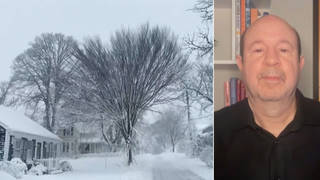
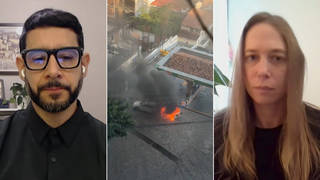
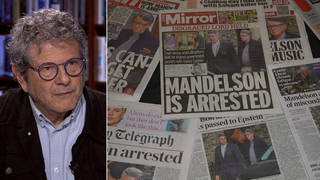
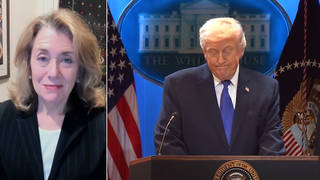





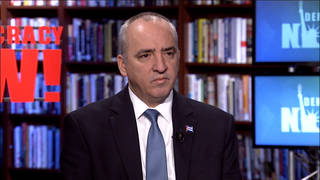
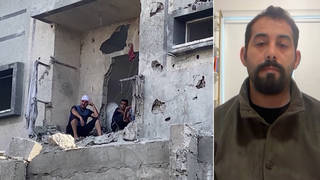
Media Options